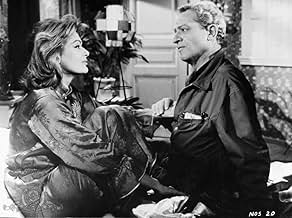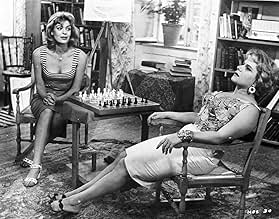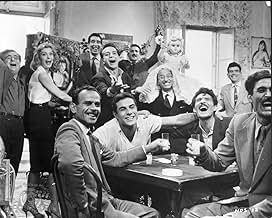NOTE IMDb
7,3/10
6,3 k
MA NOTE
Ajouter une intrigue dans votre langueAn American scholar in Greece sets about improving the prostitute with whom he is infatuated.An American scholar in Greece sets about improving the prostitute with whom he is infatuated.An American scholar in Greece sets about improving the prostitute with whom he is infatuated.
- Réalisation
- Scénario
- Casting principal
- Récompensé par 1 Oscar
- 3 victoires et 8 nominations au total
Giorgos Foundas
- Tonio
- (as Georges Foundas)
Dimitris Papamichael
- British Seaman
- (as Dimitri Papamichael)
Thanasis Vengos
- Thanasis
- (as Thanassis Veggos)
Avis à la une
Melina Mercouri, "The Last Greek Goddess", stars in the comedy "Never on Sunday"(1960) directed/written by Jules Dassin. She plays Illia, the most sensuous and radiant "lady of the night" in the seaport Pyres where every man adores her and she is the one who chooses her partners. Mercouri was 40 years old when she played Illia but she did not hide a single day of her age and she was gorgeous, full of the inner fire and absolutely irresistible. When the new Pygmalion, the intellectual American named Homer (of course) sails into the town and meets Illia, he decides that his search for meaning of life would end in Pyres if he would reform Illia and make her change her way of life. With all his intellect and education he couldn't understand a very simple truth about Illia - only true love might change her. Homer played by director/writer Jules Dassin is the weakest part of this mostly charming comedy. I agree with one of the IMDb commenters who said that "Jules Dassin has directed a great movie but he should have hired an actor to play Homer, and not played it himself... A better actor might have found a way around the rough spots but Dassin magnifies them." I guess that in real life Dassin was much more charming that in the film because he and Mercouri were married in 1966 and stayed married until her death in 1994.
7.5/10
7.5/10
SYNOPSIS: A well educated American tourists attempts to 'enlighten' a Greek prostitute in a small seaside village.
CONCEPT IN RELATION TO THE VIEWER Newer is not always better, and sometimes over analyzing a problem can only make it worse. Leave well enough alone. It is more important to be happy than to understand everything.
PROS AND CONS Every recent prostitute film from 'Irma la Duce' to 'Pretty Woman' owes a lot to this work. It was one of the first films that shed light on the idea that prostitution was a respectable and acceptable way to make a living.
If nothing else this film is a homage by Jules Dassin to his wife, Melina Mercouri. She is the focus of the film and she captivates any scene she is in with her zest for life and smoldering sexuality. The other thing you tend to fall in love with is the romantic ideal of living in Greece in 1960. It appears care free, relaxed and almost infectious with its love of the simple life.
The plot of the film is not overly complex and deals with an outsider, Homer (Dassin) arriving in town to study Greek culture. He is almost immediately captivated by Ilya (Mercouri) as one of the local prostitutes that 'freelances' and does not work for the town pimp. She negotiates a price with whomever she chooses, and sleeps with all the towns vendors in exchange for her daily goods (food, wine, drinks, etc), but she never 'works' on Sunday. Hence the title to the film.
Homer is smitten by Ilya and decides that he must 'save' her from what he perceives as a wretched life that is going no where and decides to educate her so that she can see the error of her ways. In the end, this does nothing but frustrate everyone in town. The education of Ilya does have a silver lining, which if anything, leaves the town more corrupted than when Homer found it.
The underlying theme of the film is that one should strive to be happy in what you do and more importantly, who you know. There is an interconnection between people in a small town, and disrupting those connections may lift some people up, but is not good for the whole of society. Regardless of his meddling, the towns people never turn on Homer, or blame him for anything. At their core, they know that life is to be enjoyed and blaming people for your troubles is just not part of the mix.
CONCEPT IN RELATION TO THE VIEWER Newer is not always better, and sometimes over analyzing a problem can only make it worse. Leave well enough alone. It is more important to be happy than to understand everything.
PROS AND CONS Every recent prostitute film from 'Irma la Duce' to 'Pretty Woman' owes a lot to this work. It was one of the first films that shed light on the idea that prostitution was a respectable and acceptable way to make a living.
If nothing else this film is a homage by Jules Dassin to his wife, Melina Mercouri. She is the focus of the film and she captivates any scene she is in with her zest for life and smoldering sexuality. The other thing you tend to fall in love with is the romantic ideal of living in Greece in 1960. It appears care free, relaxed and almost infectious with its love of the simple life.
The plot of the film is not overly complex and deals with an outsider, Homer (Dassin) arriving in town to study Greek culture. He is almost immediately captivated by Ilya (Mercouri) as one of the local prostitutes that 'freelances' and does not work for the town pimp. She negotiates a price with whomever she chooses, and sleeps with all the towns vendors in exchange for her daily goods (food, wine, drinks, etc), but she never 'works' on Sunday. Hence the title to the film.
Homer is smitten by Ilya and decides that he must 'save' her from what he perceives as a wretched life that is going no where and decides to educate her so that she can see the error of her ways. In the end, this does nothing but frustrate everyone in town. The education of Ilya does have a silver lining, which if anything, leaves the town more corrupted than when Homer found it.
The underlying theme of the film is that one should strive to be happy in what you do and more importantly, who you know. There is an interconnection between people in a small town, and disrupting those connections may lift some people up, but is not good for the whole of society. Regardless of his meddling, the towns people never turn on Homer, or blame him for anything. At their core, they know that life is to be enjoyed and blaming people for your troubles is just not part of the mix.
10reebee11
One of my all-time favorite movies! Coming from the 50's generation, I remember seeing this movie when I was a teenager and being absolutely fascinated by the Greek setting, music and dancing. I believe that this movie contributed to my interest in foreign movies to this day. The song "Never on Sunday" was very popular on the radio in the 60's. If you don't remember it now, you probably will, once you hear it.
The story line in this movie is clever and charming. The variety of characters pull you right into the story. It's dramatic, funny and at the same time, romantic. Tame by today's standards, this movie must have been considered very risqué for its time, but it remains entertaining to this day.....timeless!!! A must-see for old movie buffs.
The story line in this movie is clever and charming. The variety of characters pull you right into the story. It's dramatic, funny and at the same time, romantic. Tame by today's standards, this movie must have been considered very risqué for its time, but it remains entertaining to this day.....timeless!!! A must-see for old movie buffs.
"Never on Sunday", that charming Jules Dassin film, was shown unexpectedly on cable recently. The inspired story of a happy prostitute working the waterfront of Piraeus, was a smash hit everywhere when it first came out. Mr. Dassin's love poem to Greece, a land he loved, added another layer to his distinguished career. Not being known for light comedies, this movie strikes the right tone from the start. The director himself decided to play the pivotal role of Homer Thrace, a Brooklyn scholar familiar with Greek culture, but naive in matters of the heart and sex.
Ilya, a happy-go-lucky prostitute, is loved by the men working in the port. She has no hangups, something, that in contrast, Homer is full of. After all, he came from a society where sex was for the most part a taboo for the society he came from during the time period where the action takes place. After all, America was not a sexually liberated country. Ilya, on the other hand, was free to share her services openly, as she saw fit without any problem. In a way, the relationship that develops between Homer and Ilya, is a modified version of Pygmalion and Galatea, something that Homer was happy to undertake, even though he knew better not to try.
Melina Mercouri dominates the film. She obviously enjoyed getting inside her character as it clearly shows on the screen. She gave a bigger than life reading in what was her best role in the movies. Ms. Mercouri's effortless performance wins the viewer right away because one realizes she is, like Fellini's Cabiria, a genuine soul that gives love without expecting anything in return.
Jules Dassin has been criticized by some contributors to IMDb by his take on Homer, but actually, he also gives an appealing account of his scholar. Not being an actor, he understood what he wanted to accomplish with this Brooklyn man that has spent most of his life around books, but not around real life, something he finds living among the earthy people around the Greek port where he spends his vacation. In fact, he kept reminding this viewer of this type of individual that is more at home among books than with real people.
The black and white cinematography of Jacques Natteau, enhances the film and the background in which it was filmed. Manos Hatzidakis' delightful music score plays well in the story and it's never out of touch with what the director conceived. Ultimately, the film was another triumph for Jules Dassin, an American original whose body of work speak for itself.
Ilya, a happy-go-lucky prostitute, is loved by the men working in the port. She has no hangups, something, that in contrast, Homer is full of. After all, he came from a society where sex was for the most part a taboo for the society he came from during the time period where the action takes place. After all, America was not a sexually liberated country. Ilya, on the other hand, was free to share her services openly, as she saw fit without any problem. In a way, the relationship that develops between Homer and Ilya, is a modified version of Pygmalion and Galatea, something that Homer was happy to undertake, even though he knew better not to try.
Melina Mercouri dominates the film. She obviously enjoyed getting inside her character as it clearly shows on the screen. She gave a bigger than life reading in what was her best role in the movies. Ms. Mercouri's effortless performance wins the viewer right away because one realizes she is, like Fellini's Cabiria, a genuine soul that gives love without expecting anything in return.
Jules Dassin has been criticized by some contributors to IMDb by his take on Homer, but actually, he also gives an appealing account of his scholar. Not being an actor, he understood what he wanted to accomplish with this Brooklyn man that has spent most of his life around books, but not around real life, something he finds living among the earthy people around the Greek port where he spends his vacation. In fact, he kept reminding this viewer of this type of individual that is more at home among books than with real people.
The black and white cinematography of Jacques Natteau, enhances the film and the background in which it was filmed. Manos Hatzidakis' delightful music score plays well in the story and it's never out of touch with what the director conceived. Ultimately, the film was another triumph for Jules Dassin, an American original whose body of work speak for itself.
Jules Dassin has directed a delightful film starring Melina Mercouri as the happy whore with the heart of gold. As wonderful as Mercouri is, and she is wonderful, Dassin is a disaster, whose performance almost destroys his film. Clearly the low budget with which the film was made prevented his obtaining another English-speaking actor for the main male role.
Dassin, I'm sad to say, is the only actor in the film who has absolutely no personality. He comes across with all the dynamism of a dead log. How lucky we are that Ms Mercouri, who won best actress at the Cannes film festival for her role here, was at the top of her form. Without her, the film would have been forgotten decades ago. As it is, it remains a classic.
Dassin, I'm sad to say, is the only actor in the film who has absolutely no personality. He comes across with all the dynamism of a dead log. How lucky we are that Ms Mercouri, who won best actress at the Cannes film festival for her role here, was at the top of her form. Without her, the film would have been forgotten decades ago. As it is, it remains a classic.
Le saviez-vous
- AnecdotesFeatures first song ("Never On Sunday") from a foreign-made movie to win an Oscar.
- GaffesAt their first meeting, when Ilya looks at Homer through the viewfinder of his camera, he is looking straight-on at the camera. But when she looks up from the camera, Homer is sitting slightly to her left and has to turn to his right -- and thus is not looking straight-on -- when he speaks to her.
- ConnexionsFeatured in Toute la chanson: Épisode datant du 30 mai 1960 (1960)
Meilleurs choix
Connectez-vous pour évaluer et suivre la liste de favoris afin de recevoir des recommandations personnalisées
- How long is Never on Sunday?Alimenté par Alexa
Détails
Box-office
- Budget
- 151 000 $US (estimé)
- Durée1 heure 31 minutes
- Couleur
- Mixage
- Rapport de forme
- 1.66 : 1
Contribuer à cette page
Suggérer une modification ou ajouter du contenu manquant







































